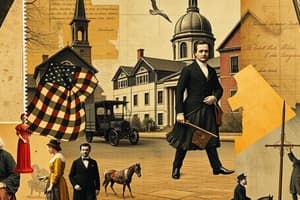Podcast
Questions and Answers
Who was the second president of the United States?
Who was the second president of the United States?
- Thomas Jefferson
- John Adams (correct)
- George Washington
- James Madison
Thomas Jefferson and Aaron Burr were running mates in the election of 1800.
Thomas Jefferson and Aaron Burr were running mates in the election of 1800.
True (A)
What did Jefferson call the election of 1800?
What did Jefferson call the election of 1800?
Revolution
What are lame-duck patronage positions?
What are lame-duck patronage positions?
What were the Alien and Sedition Acts used for?
What were the Alien and Sedition Acts used for?
Who was Jefferson's financial adviser?
Who was Jefferson's financial adviser?
What was the Judiciary Act of 1801 known for?
What was the Judiciary Act of 1801 known for?
What did John Marshall contribute to the Supreme Court?
What did John Marshall contribute to the Supreme Court?
What was the outcome of Marbury vs. Madison?
What was the outcome of Marbury vs. Madison?
Samuel Chase was successfully impeached.
Samuel Chase was successfully impeached.
What was the Tripolitan War?
What was the Tripolitan War?
What was the mosquito fleet?
What was the mosquito fleet?
Who sold Louisiana to the U.S.?
Who sold Louisiana to the U.S.?
What was significant about the Louisiana Purchase?
What was significant about the Louisiana Purchase?
What did Lewis and Clark achieve during their expedition?
What did Lewis and Clark achieve during their expedition?
What did Tecumseh aim to achieve?
What did Tecumseh aim to achieve?
The Embargo Act of 1807 was a popular decision.
The Embargo Act of 1807 was a popular decision.
Why did Madison ask Congress to declare war on Britain?
Why did Madison ask Congress to declare war on Britain?
Flashcards are hidden until you start studying
Study Notes
John Adams
- Second President of the United States, representing the Federalist Party.
- Refused to engage America in war with France, raising a navy instead.
- Allowed the Alien and Sedition Acts to pass, leading to unpopularity at the end of his presidency.
Thomas Jefferson and Aaron Burr
- Running mates in the election, with Burr being unpopular.
- House of Representatives had to break the tie, leading to Jefferson's presidency.
- Burr's later conspiracy to secede New England and New York, and his trial for treason.
Revolution of 1800
- Jefferson viewed the 1800 election as a revolution intended to restore original republican ideals.
- Emphasized peaceful transfer of power from Federalists to Democratic-Republicans.
Alien and Sedition Acts
- Instruments for silencing the Democratic-Republicans, limiting free speech and extending naturalization requirements to 14 years.
- Jefferson's administration abolished these acts.
Judiciary Act of 1801 and Midnight Judges
- Last-minute Federalist law creating 16 judicial appointments; seen as an effort to entrench Federalists in power.
- Jefferson’s administration later repealed this act.
John Marshall
- Cousin of Jefferson, became a significant Supreme Court Justice focused on establishing constitutional foundations for judicial power.
Marbury v. Madison
- Landmark case establishing judicial review, determining that the Supreme Court could declare laws unconstitutional.
Samuel Chase
- Unpopular Supreme Court Justice whose impeachment was attempted by Jeffersonians but failed, marking a significant moment for judicial independence.
Tripolitan War
- Conflict that arose when Jefferson refused to pay a pasha, leading to a military response and eventual peace accord.
Louisiana Purchase
- Massive territorial acquisition of land west of the Mississippi sold by Napoleon for $15 million, effectively doubling the size of the U.S.
- Jefferson was initially anxious about the financial implications and the large territory acquired.
Lewis and Clark Expedition
- Exploration mission into newly acquired territory with goals of mapping and gathering scientific data, guided by Sacajawea.
Impressment and Embargo Acts
- British practice of forcibly enlisting American sailors angered the public and influenced U.S. neutrality.
- The Embargo Act of 1807 aimed to economically pressure Britain and France but resulted in severe backlash and economic hardship in the U.S.
War Hawks
- Young Congress members who advocated for war against Britain, driven by patriotism and territorial expansion.
Tecumseh and the Prophet
- Shawnee brothers who tried to form an Indian confederacy to resist the advance of American settlers in the West.
Mr. Madison's War
- War of 1812 declared to curb British support of Native American resistance and to reaffirm U.S. sovereignty and integrity.
Impact of European Conflicts on U.S. Neutrality
- American neutrality was compromised as Britain and France’s conflicts spilled into U.S. economic affairs, drawing the nation into conflict despite its non-combatant stance.
Conclusion
- The events leading up to and during this era were crucial in shaping the U.S. political landscape, including expanding territory, judicial authority, and conflicts abroad that challenged American sovereignty and neutrality.
Studying That Suits You
Use AI to generate personalized quizzes and flashcards to suit your learning preferences.




